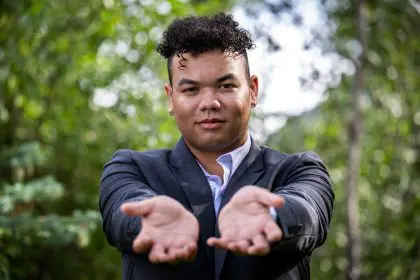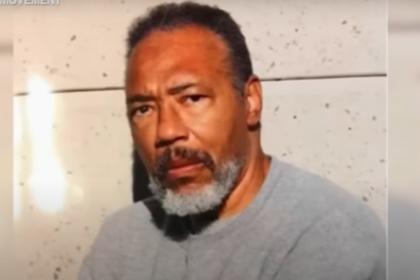
Monroe Anderson’s storied media career had a bang of a start: “I have the dubious distinction of being one of the first journalists beaten by the Chicago Police,” Anderson chuckles. “As a result of being beaten by the police, I became Newsweek’s star intern.”
Anderson’s experience includes broadcast television, public relations and bylines in Newsweek, Chicago Sun-Times, Chicago Tribune, Chicago Defender, N’Digo, Savoy, and Ebony.
Even in this ever-transitioning world of journalism, Anderson is riding high, in this chapter as a cyber-columnist.
Renaissance man Monroe Anderson talks to rolling out about the jobs he’s held, the publication that still owes him money, his Facebook addiction, the future of journalism, his latest transformation and the secret to his media success. –zondra hughes
How were you introduced to journalism?
I was an intern for Newsweek magazine in 1968, and I covered the Democratic National Convention. [After the police beating] they flew me to New York, put me up at the Waldorf Astoria, where I spoke at some large group of muckety mucks. I had no idea of who they were. A Yale Law school alum approached me and asked me if I wanted a career in law, but I was so turned on by journalism after covering the police riot in Chicago that I didn’t even consider it. But I tell people, had I followed up on it, I could have been Clarence Thomas [laughs].
I graduated from Indiana University in 1970, went to work for the National Observer in D.C.; I was the first black reporter they ever hired. I was there for two years and, then, I came to Ebony. I was there from 1972-74. I’m one of those pictured with the new building, and I’m in my cubicle.
From there, I went to the Chicago Tribune; I was there for 10 years. I did lots of things, from investigative to politics. I covered Harold Washington’s election. I left there and went to Newsweek, the Chicago bureau. Then, I became press secretary to Mayor Eugene Sawyer, and I did that until he lost [re-election] to Mayor Richard M. Daley.
Then, I went to WBBM TV, where I was the director of station services and community affairs and executive producer and host of the show, “Common Ground,” and I did that until I retired in 2002.
In 2003, I got a call from N’Digo. [Publisher] Hermene [Hartman] asked me to be editor of the magapaper. I enjoyed it and, then, Savoy was bought, and I enjoyed it a lot more. And when that folded…well, you can’t go from Savoy back to N’Digo.
What do you mean by that?
You just can’t do that psychologically. Savoy was so cool. It was national, it was slick, and I had writers that I can pay money to, who knew how to write.
How did you rebound from losing Savoy?
I went home and, then, I started writing an Op-ed [opinion editorial] column for the Sun-Times, and I did that for almost a year and a half.
What happened at the Sun-Times?
I was in South Africa on a Kaiser Family Foundation traveling media seminar, and I got an e-mail that sounded frantic. It was from my editor. I responded, “They’re cancelling my column.” And she said, “Yes. I’m so sorry.”
Why did they cancel your column?
The Sun-Times, in its wisdom, had decided that they wanted bigger fonts, bigger graphics and fewer writers and on their Op-ed page, so they got rid of me and a few others.
How did you rebound from that?
That’s when I got into blogging. I was blogging for that first publication (Ebony), and I did that until it occurred to me there was a certain amount of money that I had not received and was not going to receive [laughs]. They owed me for my contributions, so I just did my own blog, and, now, I’m Facebooking and writing for The Root and The Huffington Post.
What do you write about on your own blog?
I’m not writing much of it anymore because I got hooked on Facebook.
Blogging is a lot of work. It’s a full day of research and writing for nothing.
It’s the same with journalism. If you’re not a credible source, somebody is not going to read you at some point. In blogging, in particular, if you’re trying to persuade people to see your point of view, then you’ve got to be right. Because if you’re not, then they will latch on to that factual error you made and discount everything you’re arguing. Plus, I’m a brand and an old-style journalist, so I believe in research and getting my facts right.
What do you think the future holds for print media?
I think of newspapers and magazines as poetry. There was a time when people read it, but, now, they still have readers, but they are a cult … very odd people. Everybody else is doing something else. Everybody else is going online. If you notice, I call myself a cyber-columnist.
How have you repositioned yourself as a cyber-columnist?
I’ve been making the transition for about four years now because as newspapers were laying off people and magazines and TV stations, all my old friends were sitting around bitching and moaning and talking about the good ol’ days and how everything is being ruined. I figure, rather than bitch and moan about what used to be, I should learn what’s going on, and go to the future of what is happening.
It’s a golden opportunity. When I went into journalism in 1970, all the rules were there, so they would tell me that you can’t do it this way, you do it that way, etc. Right now, it’s evolving, so I can have an impact on how it’s done.
What’s your advice for those entering the field of journalism today?
I taught at Columbia College , also, and I taught my students to be sure that you can multiplatform, that you know how to write, print, speak on-air, broadcast and that you’re visual, that you can do visual things.
What’s your best advice for your retiring colleagues?
I hope that you made wise investments in the stock market.













